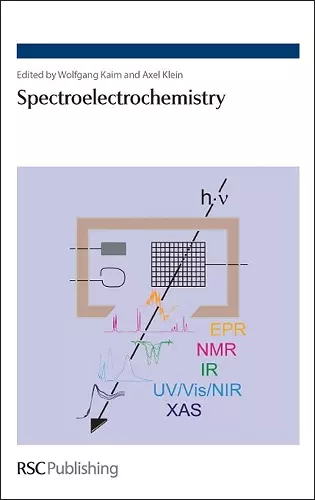Spectroelectrochemistry
Axel Klein editor Wolfgang Kaim editor
Format:Hardback
Publisher:Royal Society of Chemistry
Published:15th Jul '08
Currently unavailable, and unfortunately no date known when it will be back

Electrochemistry affects several relevant research subjects of physics, chemistry and biology such as the transformation of materials, the transfer of information (especially in living systems), or the conversion and storage of energy. In addition, electrochemical processes constitute a major class of chemical reactions both in the laboratory and on large industrial scales. While conventional analytical electrochemistry provides excellent methods to determine concentrations (e.g. in sensor technology), to yield energy data in the form of redox potentials and to elucidate formal reaction mechanisms via kinetic analysis, these techniques alone are often not immediately suitable to identify unknown species which are formed as intermediates or as products in a redox reaction. The combination of reaction-oriented electrochemistry with species-focussed spectroscopy in spectroelectrochemistry can solve this problem and thus allow for a more complete analysis of electron transfer processes and complex redox reactions. Many research groups from various sub-fields of the chemical sciences have engaged in recent years in using and developing this combined methodology. While the technique has been well developed during the last few decades, its application in various fields of chemistry has only recently become more widespread. Readily accessible, inexpensive equipment and lower barriers to application have contributed to this situation and, at the same time, it is becoming less and less acceptable in chemical research to assign redox transformations without spectral evidence. Spectroelectrochemistry has therefore evolved as a powerful yet usually inexpensive technique which yields mechanistic (chemistry), energy-relevant (electro) as well as electronic structure information (spectro). The whole range of the electromagnetic spectrum can be employed from x-ray absorption to NMR spectroscopies. Yet while the method has become more commonplace, there are still aspects to be considered which require sound knowledge and experience. This book serves as a guide and as an illustration of the kind of research where spectroelectrochemistry can make a difference in the understanding of redox reactions through identification of their intermediates and products. Relevant examples involving UV-VIS-NIR and IR absorption spectroscopy as well as electron paramagnetic resonance (EPR) are presented in this book with the objective to illustrate the potential and the applications of this technique and to provide practical information. The topics covered include: "organometallics "coordination compounds (mixed-valent complexes, metalloporphyrins) "compounds of biochemical interest such as iron-containing proteins The breadth...
"....Spectroelectrochemistry is a quality offing that will Interoduce the reader to the wide applicability of spectroelectrochemical methods. THe broad coverage and interdisciplinary nature of the topics, the mixture of introductory and more advanced material and the illustrative examples od spectroscopic tabular data should make this book useful to both novices and experienced researchers in the field."
* JACS *"...neverthless the book can be recommended for libraries of research institutions where basic spectroscopic tools are employed in these areas of chemistry."
* Journal of Solid State ElectrochemistISBN: 9780854045501
Dimensions: unknown
Weight: 1161g
236 pages